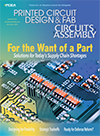ELK GROVE VILLAGE, IL -- SigmaTron International, an electronic manufacturing services company, today reported first-quarter earnings of $165,067 on revenues of $21.3 million. Both figures were down year-over-year.
VANCOUVER, British Columbia -- Nam Tai Electronics achieved a new monthly sales record of $67 million in August.
The previous single month sales record was $63 million in April 2005.
"We are very delighted with these results," said Joseph Li, chief executive. "With our continued growth, we look forward to a successful third quarter."
The previous single month sales record was $63 million in April 2005.
"We are very delighted with these results," said Joseph Li, chief executive. "With our continued growth, we look forward to a successful third quarter."
ARLINGTON, TX -- VirTra Systems, Inc. has announced a preliminary manufacturing and
marketing agreement under which Sanmina-SCI would provide manufacturability analysis, bid proposal and marketing support, and manufacturing services for VirTra Systems' military training simulators.
"We are excited about the opportunities provided by VirTra Systems' new IVR 4G(TM) simulator and we expect to excel within this segment of the defense market," said Steve Roser, vice president of business development for Sanmina-SCI's Defense and Aerospace Systems division. "VirTra Systems' simulation technology is a perfect complement to our Defense and Aerospace Systems division. With demand for military virtual reality simulators rapidlyaccelerating, we believe the market for VirTra Systems' IVR 4G simulator products will be considerable."
"This partnership with Sanmina-SCI enables us to greatly increase short-term production capabilities while ensuring large multi-system purchasers of timely delivery with a top-tier, worldwide support infrastructure," said L. Kelly Jones, VirTra Systems' chief executive.
marketing agreement under which Sanmina-SCI would provide manufacturability analysis, bid proposal and marketing support, and manufacturing services for VirTra Systems' military training simulators.
"We are excited about the opportunities provided by VirTra Systems' new IVR 4G(TM) simulator and we expect to excel within this segment of the defense market," said Steve Roser, vice president of business development for Sanmina-SCI's Defense and Aerospace Systems division. "VirTra Systems' simulation technology is a perfect complement to our Defense and Aerospace Systems division. With demand for military virtual reality simulators rapidlyaccelerating, we believe the market for VirTra Systems' IVR 4G simulator products will be considerable."
"This partnership with Sanmina-SCI enables us to greatly increase short-term production capabilities while ensuring large multi-system purchasers of timely delivery with a top-tier, worldwide support infrastructure," said L. Kelly Jones, VirTra Systems' chief executive.
BERLIN -- Hewlett-Packard Co. is cutting 5,900 jobs across Europe in an effort to reduce overhead costs.
About 1,500 jobs will be cut in Germany, where HP currently employs 9,000 workers.
The first layoffs will come next July and expected to continue through early 2007.
HP employs about 44,000 workers in Europe, the Middle East and Africa.
About 1,500 jobs will be cut in Germany, where HP currently employs 9,000 workers.
The first layoffs will come next July and expected to continue through early 2007.
HP employs about 44,000 workers in Europe, the Middle East and Africa.
NEW YORK – More acquisitions are ahead for Dover Corp., the parent company of Dover Technologies. So said company executives during its annual investor conference today.
ORANGE, CA – Inspex Inc. has begun quickturn x-ray inspection services for PCBs, semiconductor packaging and assembly.
The firm handles inspection of BGA, QFPs and PLCC components on all types of assemblies, plus other semiconductor components, active and passive devices, multilayer PCBs, molded and encapsulated components, connectors and cables.
The company is capable of 24-hour turns, president Jay Adams said in a press release.
The firm handles inspection of BGA, QFPs and PLCC components on all types of assemblies, plus other semiconductor components, active and passive devices, multilayer PCBs, molded and encapsulated components, connectors and cables.
The company is capable of 24-hour turns, president Jay Adams said in a press release.
Press Releases
- Scanfil and Valmet to Strengthen Their Business Relationship in Electronics Manufacturing Services
- KIC Relocates Global Headquarters to New San Diego Facility
- Nihon Superior Co. Ltd. Mourns the Passing of Keith Howell
- Mobius Materials Raises $3M to Combat One of Manufacturing’s Biggest Issues Amid US-China Trade Tariffs


